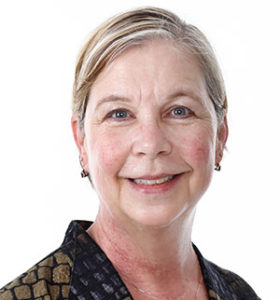|
Monday June 21st, In Person and Virtual St. James Ballroom – Hilton New Orleans Riverside |
||
ChairsJoel Myers, CEO of Domila Ltd., Dublin, IrelandRebecca Lee Hammons, Ball State University, Muncie, Indiana USA |
||
| US Eastern Time | Session | Speakers |
|
08:30am-10:30am EDT
(7:30am-9:30am Central Time)
|
Vert6.1 |
Community, Education & Employment: engagement, youth programs and careers
|
| Plenary Session | ||
|
01:30pm-03:30pm EDT
(12:30pm-2:30pm Central Time)
|
Vert6.2 |
Power & Energy: clean, affordable and sustainable
|
| Afternoon Break | ||
| 04:00pm-06:00pm
EDT
(03:00pm-5:00pm Central Time)
|
Vert6.3 |
1. Monica Teets Farris, Director, UNO-CHART, New Orleans, LA USA)
2. Ramesh Kolluru, VP for Research, Innovation & Economic Development at the University of Louisiana atLafayette, Lafayette, LA USA 3. Raju Gottumukkala, Director of Research of Informatics Research at the University of Louisiana at Lafayette, Lafayette, LA USA 4. John Snow, Partner, Emergent Method, Baton Rouge, LA USA |
Description
Today, the places we call home – where we work or study – our towns and cities, have changed radically. The COVID-19 pandemic has brought a cruel but critical wake up call. There is a new balance. A rethinking of what is of paramount importance to humanity. Protecting our health and community spirit. Safeguarding the local economies and jobs that keep our surroundings alive. Achieving a stronger level of resilience for our cities, from external and global influences. This change was already coming. A people-centric approach to delivering well-being in our cities has been a greater focus of smart city strategies and frameworks for the past few years. Urban digital transformation that is community-driven rather than technology-driven has been progressively making headway. Yet, this pandemic has accelerated the process. Whether we are developing new standards, best practices, playbooks, a smart city strategy, policies or solutions, listening and engaging with city stakeholders is, more than ever, fundamental.
Self-isolation and social distancing have released a new wave of digital communications between families, young to old. It has not only created a vastly wider audience of tech-savvy people, including the elderly, but a relationship with technology that responded to the needs of people to stay in touch or work from a distance. When technology responds and supports the basic needs of humanity, then it creates trust and adoption. In many households, during the pandemic, for kids and adults, this new wave of digital communications also underlined a stark issue. That of digital equality. Technology must be accessible to everyone.
As technologists, we have a strong opportunity to embrace this “people-centric” approach and collaborate with city stakeholders from the outset and invite citizens to get involved in the technology that will build in their future.
In this year’s Smart Cities track of the IEEE World Forum on IoT, in our June and July 2021 sessions, we will be focusing on this highly “people-centric” approach to digital transformation in cities. We will be looking at community engaged strategies, frameworks and projects that make smarter towns, cities and regions.
Our goal during this Smart Cities track, of the IEEE IoT World Forum on IoT, is to provide a platform for communications and collaboration on the state-of-the art in IoT. Not just between industry, government and research, but in reply to its complexity, we are inviting international experts across wider fields to join the conversation: from community to economics and finance; from healthcare to agriculture; and from urban planning to the environment, in order to provide a clear picture as to where we are today and where we are heading with the future of humankind and technology.
On the 21 June 2021, we will be holding three 2-hour sessions live from New Orleans, LA (USA) to a physical audience and broadcast worldwide, where leading Louisiana, national and international speakers from government, industry, community and education will present and discuss their perspectives on digital transformation in towns and cities.
Our goal in this event and within the IEEE Initiative for Smart Cities is for technologists to work alongside city stakeholders: government; industry; academia; community associations and the general public, to provide standards, best practices and digital transformation where required and in a way that respects and enhances the lives and livelihoods of citizens.
On 21 June 2021 we will be running 3 sessions on Smart Cities, each of a duration of 2 hours, with presentations, Q&A and panel discussions. The sessions will be will hybrid, with a local and international component, including local speakers and a reduced audience attending in New Orleans, with international leading experts and audience from around the world linking in virtually.
Track Co-Chairs
Joel Myers, CEO of Domila Ltd. (Dublin, Ireland)
 Co-Chair of the IEEE IoT Initiative Smart Cities Working Group.
Co-Chair of the IEEE IoT Initiative Smart Cities Working Group.
Leading technologist specializing in the creation and development of innovation technology solutions in the communications and management of services in Cultural Heritage, Tourism, and since 2015 in Business Networking.
His company, HoozAround Corp. is currently commercialising a mobile application called HoozAroundTM. This App offers very close-proximity networking for users to carry out business and social networking based on profile matching needs or interests in real-time, indoors and outdoors. Its aim is to bring people together that would otherwise never meet, face-to-face, in order to create new and more efficient opportunities to grow personally, socially as a city-wide community and in developing business. The app was successfully piloted at the IFA Berlin consumer electronics trade fair in 2017 and at the IEEE World Forum on IoT in February 2018 (Singapore).
Over the past few years Joel Myers has been focusing on the redefinition of the “Internet of People” exploring the goals of the smart city industry movement juxtaposed with the need for humanity to remain connected as physical people.
The work carried out by Joel Myers has been published in international newspapers and journals such as the BBC, New York Times, Hong Times, the Hindu Times, Wired, and Forbes Magazine.
Rebecca Lee Hammons, Ball State University, Muncie, Indiana USA
Rebecca Hammons is an associate professor in the Center for Information and Communication Sciences (CICS), a top-rated technology master’s program at Ball State University. She has extensive technology industry experience in establishing and leading software quality assurance, product development, project management, and IT teams. Dr. Hammons has worked for Ontario Systems, Apple, Raytheon, Tivoli Systems and Wang, in addition to several niche software firms. She is a Certified Quality Manager and Certified Software Quality Engineer with the American Society for Quality (ASQ) and a Certified Scrum Master and Certified Scrum Product Owner with Scrum Alliance. Dr. Hammons received her Ed.D. and M.A. from Ball State University, her B.A. from Michigan State University, and is completing her Master’s Certificate in Positive Psychology at the University of Missouri.
In CICS, she teaches Product Management, the Design of the User Experience/Human Factors, Human Communications Theory and Practice, Software Quality Assurance, Management, and other courses relevant to successful software and technology industry practice.
She is co-chair of the IEEE IoT Initiative Smart Cities Working Group, chair of the Global Cities Teams Challenge Ethics Action Cluster (NTIA/NIST), and chair of the Internationalization Taskforce for the College of Communication, Information and Media at Ball State University.
Current technology industry research interests include Ethics in Smart Cities, the Internet of Things for Elders, nd Gold-Collar Workers. Dr. Hammons thrives on leading organizational change initiatives and coaching individuals and teams to reach their full potential.
Speakers
Amir Banifatemi, Chief Innovation and Growth Officer at XPRIZE, and the founder of AI Commons initiative
 Amir Banifatemi is the Chief Innovation and Growth Officer at XPRIZE, the founder of AI Commons initiative, and the AI for Good global summit with the UN. He is a tireless entrepreneur and investor and bring more than 25 years of experience in development and growth of emerging and transformative solutions that can impact society in significant and exponential ways. He began his career at the European Space Agency and then held executive positions at Airbus, AP-HP and the European Commission division for information society and media. He managed two venture capital funds and contributed to the formation of more than 10 startups with emphasis on AI, Robotics and Digital Health.
Amir Banifatemi is the Chief Innovation and Growth Officer at XPRIZE, the founder of AI Commons initiative, and the AI for Good global summit with the UN. He is a tireless entrepreneur and investor and bring more than 25 years of experience in development and growth of emerging and transformative solutions that can impact society in significant and exponential ways. He began his career at the European Space Agency and then held executive positions at Airbus, AP-HP and the European Commission division for information society and media. He managed two venture capital funds and contributed to the formation of more than 10 startups with emphasis on AI, Robotics and Digital Health.
Mr. Banifatemi is a guest lecturer and an adjunct MBA professor at UC Berkeley, Chapman University, Claremont McKenna College, UC Irvine, and HEC Paris.
He holds a Master’s degrees in electrical engineering from the University of Technology of Compiègne, a Doctorate in System Design from the University Paris Descartes, as well as an MBA from HEC Paris.
Assaf Frances, Director of Urban Policy and Partnerships at Zencity (Israel)
 As the Director of Urban Policy and Partnerships at Zencity, Assaf oversees special research projects and manages the company’s relationships with industry, state, and national government organizations. He is also in charge of the company’s events and conferences and leads the PR work. Prior to his work at Zencity, Assaf served as a Senior Project Manager for the City of Tel Aviv’s Innovation Team (i-team) supported by Bloomberg Philanthropies. As part of his role on the i-team, Assaf spearheaded several projects including improving the city’s cleanliness, decreasing loneliness amongst the elderly, and reducing the cost of living for young families. While living in London, Assaf was a project manager for the NESTA UK Innovation Lab. Assaf holds an MSc. in Urban Regeneration from the Bartlett School of Planning, UCL, London. Assaf is a member of the Salzburg Global Forum and a Chevening Alumni.
As the Director of Urban Policy and Partnerships at Zencity, Assaf oversees special research projects and manages the company’s relationships with industry, state, and national government organizations. He is also in charge of the company’s events and conferences and leads the PR work. Prior to his work at Zencity, Assaf served as a Senior Project Manager for the City of Tel Aviv’s Innovation Team (i-team) supported by Bloomberg Philanthropies. As part of his role on the i-team, Assaf spearheaded several projects including improving the city’s cleanliness, decreasing loneliness amongst the elderly, and reducing the cost of living for young families. While living in London, Assaf was a project manager for the NESTA UK Innovation Lab. Assaf holds an MSc. in Urban Regeneration from the Bartlett School of Planning, UCL, London. Assaf is a member of the Salzburg Global Forum and a Chevening Alumni.
Christopher Tyson, President and CEO of Build Baton Rouge
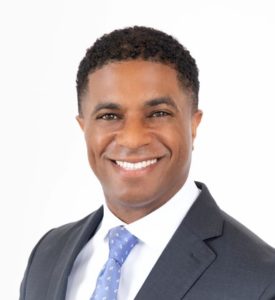 Christopher J. Tyson is the President and CEO of Build Baton Rouge, which works to bring people and resources together to promote equitable investment, innovative development, and thriving communities across all of Baton Rouge. Chris is currently on leave from his position as the Newman Trowbridge Distinguished Professor of Law at the LSU Law Center. He has published numerous academic and editorial works that have appeared in the New York Times and the Harvard Journal on Racial & Ethnic Justice. He holds degrees in architecture, public policy, and law from Howard University, the Harvard Kennedy School, and Georgetown University, respectively.
Christopher J. Tyson is the President and CEO of Build Baton Rouge, which works to bring people and resources together to promote equitable investment, innovative development, and thriving communities across all of Baton Rouge. Chris is currently on leave from his position as the Newman Trowbridge Distinguished Professor of Law at the LSU Law Center. He has published numerous academic and editorial works that have appeared in the New York Times and the Harvard Journal on Racial & Ethnic Justice. He holds degrees in architecture, public policy, and law from Howard University, the Harvard Kennedy School, and Georgetown University, respectively.
John Snow, Partner, Emergent Method (Baton Rouge LA, USA)
 John is an experienced management consultant with more than 14 years of experience working with local, regional, and state agencies on a variety of programs, projects, and policies focused on technology, innovation, planning, and performance. He is a partner at Emergent Method, one of the nation’s fastest-growing consulting firms based in Baton Rouge, Louisiana, where he leads teams of consultants in client engagements involving organizational design, citizen and stakeholder engagement, strategic planning, digital communications, and more. He holds a bachelor’s degree and his MBA both from Louisiana State University.
John is an experienced management consultant with more than 14 years of experience working with local, regional, and state agencies on a variety of programs, projects, and policies focused on technology, innovation, planning, and performance. He is a partner at Emergent Method, one of the nation’s fastest-growing consulting firms based in Baton Rouge, Louisiana, where he leads teams of consultants in client engagements involving organizational design, citizen and stakeholder engagement, strategic planning, digital communications, and more. He holds a bachelor’s degree and his MBA both from Louisiana State University.
Keith Hanson, Chief Technology Officer, City of Shreveport LA
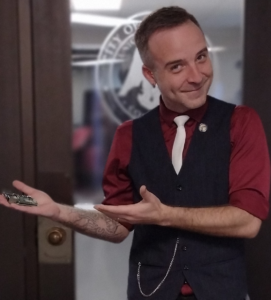 Keith Hanson was born and raised in the Shreveport/Bossier metro. A self-taught software developer, Keith started his first business at the age of 22 that turned into a thriving software development consultancy for just over 9 years that trained local high school and college students to use bleeding edge software techniques and technologies for mobile app and web development for the private sector.
Keith Hanson was born and raised in the Shreveport/Bossier metro. A self-taught software developer, Keith started his first business at the age of 22 that turned into a thriving software development consultancy for just over 9 years that trained local high school and college students to use bleeding edge software techniques and technologies for mobile app and web development for the private sector.
After complaining for years about the various problems within Shreveport, Keith ran for city council (unsuccessfully) and met the then mayoral candidate, Adrian Perkins, whose primary objectives mirrored his own: Universally Affordable Broadband, a “smart city”, and using data and transparency to greater effectiveness within city departments.
Upon being elected, Mayor Perkins created the first Chief Technology Officer position and appointed Keith as a way to lift the stagnant IT department into the 21st century, as well as bring more focus from the IT department on our external AND internal problems.
Upon appointment, Keith re-organized the department, creating both a “Special Projects” division as well as an IoT division to begin building open-source, home-grown, affordable smart city solutions for any city to adopt and contribute to.
To date, they have created two devices around measuring broadband adoption and are currently building a city-wide, secure, and decentralized public safety camera network.
Liz Shephard, Founder & CEO, LifeCity, L3C (New Orleans LA, USA)
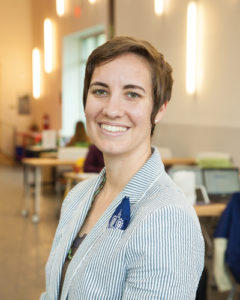 Liz Shephard is the CEO of LifeCity, L3C, a for-benefit company. Liz created LifeCity to help build a more equitable and sustainable economy in New Orleans, but is now bringing these tools to communities all over the country. In May of 2017, LifeCity won the SBA’s state-wide Sustainable Business Champion Award and Liz was also recognized as one of the Top 50 Business Women of the year in 2015 in New Orleans (CityBusiness). Trained as both a facilitator and LEED Green associate, Liz and her company help businesses maximize both social and environmental impact while growing profits. Liz holds a B.A. in Psychology and Environmental Studies from Carleton College, where she graduated with Honors and Distinction. Outside of work, Liz plays in a band, Mid City Soul, enjoys runs on the greenway, and her spiritual practice in meditation and contemplative prayer.
Liz Shephard is the CEO of LifeCity, L3C, a for-benefit company. Liz created LifeCity to help build a more equitable and sustainable economy in New Orleans, but is now bringing these tools to communities all over the country. In May of 2017, LifeCity won the SBA’s state-wide Sustainable Business Champion Award and Liz was also recognized as one of the Top 50 Business Women of the year in 2015 in New Orleans (CityBusiness). Trained as both a facilitator and LEED Green associate, Liz and her company help businesses maximize both social and environmental impact while growing profits. Liz holds a B.A. in Psychology and Environmental Studies from Carleton College, where she graduated with Honors and Distinction. Outside of work, Liz plays in a band, Mid City Soul, enjoys runs on the greenway, and her spiritual practice in meditation and contemplative prayer.
Matt Cox, Founder and CEO of Greenlink Analytics (Atlanta, GA, USA)
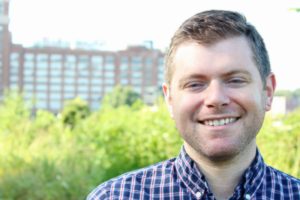 Matt Cox, Ph.D., is the founder and CEO of Greenlink Analytics, an energy research and advisory non-profit based in Atlanta, GA. Matt leads a diverse team of experts focused on equitable clean energy transitions that has identified pathways to avoid 3.5 billion tons of CO2 emissions and save 1300 lives while saving $400 billion. He has authored over 90 scientific publications in energy policy, renewable energy, energy efficiency, economic development and job creation, the social and environmental impacts of energy use, and water policy. His policy recommendations have been adopted by dozens of cities and states, the U.S. government, and 12 other nations. He has been called as an expert over 20 times at state public utility commissions and legislative bodies, primarily for city and utility energy policy issues. Matt holds a Ph.D. in climate and energy policy from the Georgia Institute of Technology.
Matt Cox, Ph.D., is the founder and CEO of Greenlink Analytics, an energy research and advisory non-profit based in Atlanta, GA. Matt leads a diverse team of experts focused on equitable clean energy transitions that has identified pathways to avoid 3.5 billion tons of CO2 emissions and save 1300 lives while saving $400 billion. He has authored over 90 scientific publications in energy policy, renewable energy, energy efficiency, economic development and job creation, the social and environmental impacts of energy use, and water policy. His policy recommendations have been adopted by dozens of cities and states, the U.S. government, and 12 other nations. He has been called as an expert over 20 times at state public utility commissions and legislative bodies, primarily for city and utility energy policy issues. Matt holds a Ph.D. in climate and energy policy from the Georgia Institute of Technology.
Monica Farris, Director of the University of New Orleans’ Center for Hazards Assessment, Response and Technology (UNO-CHART)
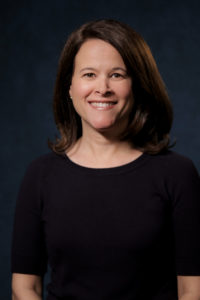 Dr. Monica Farris is the Director of the University of New Orleans’ Center for Hazards Assessment, Response and Technology (UNO-CHART) and a newly appointed Assistant Professor in Planning & Urban Studies. Dr. Farris’ current applied research focuses on climate migration and receiving communities, residential risk disclosure, climate adaptation planning, repetitive flood loss, and building statewide floodplain management capacity as part of the La Watershed Initiative. She has published on building internal capacity for disaster resilience and has presented multiple times on hazard risk reduction and disaster planning. Dr. Farris is also recognized as a Certified Floodplain Manager by the Association of State Floodplain Managers.
Dr. Monica Farris is the Director of the University of New Orleans’ Center for Hazards Assessment, Response and Technology (UNO-CHART) and a newly appointed Assistant Professor in Planning & Urban Studies. Dr. Farris’ current applied research focuses on climate migration and receiving communities, residential risk disclosure, climate adaptation planning, repetitive flood loss, and building statewide floodplain management capacity as part of the La Watershed Initiative. She has published on building internal capacity for disaster resilience and has presented multiple times on hazard risk reduction and disaster planning. Dr. Farris is also recognized as a Certified Floodplain Manager by the Association of State Floodplain Managers.
Parviz Rastgoufard, The University of New Orleans Professor and Entergy Endowed Chair for Power Systems Engineering, USA
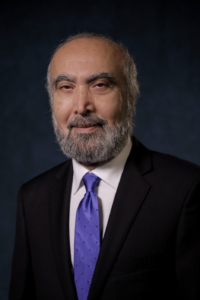 Parviz Rastgoufard joined the University of New Orleans (UNO) and serves as the Entergy Endowed Chair for Power Systems Engineering – a $2 million endowment established by Louisiana Board of Regents and Entergy Services Inc – since August 2007. He is currently engaged in research and teaching Power Systems Engineering and serves as the Director of Power & Energy Research Laboratory (PERL) and the General Chair of the UNO Engineering Forum since 2009. In these capacities he has chaired panels of experts on Engineering Education, Cybersecurity, and Smart Cities in the years 2016, 2017, and 2019 respectively.
Parviz Rastgoufard joined the University of New Orleans (UNO) and serves as the Entergy Endowed Chair for Power Systems Engineering – a $2 million endowment established by Louisiana Board of Regents and Entergy Services Inc – since August 2007. He is currently engaged in research and teaching Power Systems Engineering and serves as the Director of Power & Energy Research Laboratory (PERL) and the General Chair of the UNO Engineering Forum since 2009. In these capacities he has chaired panels of experts on Engineering Education, Cybersecurity, and Smart Cities in the years 2016, 2017, and 2019 respectively.
Before joining UNO, he served in many roles at Tulane University from 1987 to 2007, including Professor and Chair of Electrical Engineering and Computer Science (1998 – 2007); Director of Electric Power Research Laboratory (1991 – 2007); Chair of American Association of University Professors (2003 – 2007); member of Tulane Senate for six years, and Entergy Endowed Chair in Electric Power Engineering (1998 –2007). Through collaboration between Entergy and Tulane School of Business and School of Engineering, he was instrumental in creation of Entergy-Tulane Energy Institute in 2004-2007. He served as General Chair of Society for Electric Power Research Implementation (SEPRI), a collaboration between universities and industry in State of Louisiana, during 1990-1994, and the co-founder of Tulane Engineering Forum serving as the member of its organizing committee during 1998-2004. Parviz serves as the Emeritus Professor of Electrical Engineering and Computer Science and Emeritus Entergy Endowed Chair for Electric Power Engineering at Tulane University since July 2007.
Prior to joining Tulane University, he was a member of faculty of Department of Electrical and Computer Engineering (ECE) at North Carolina State University in the years 1983-1987 and founding member of Electric Power Research Center – established by Department of Nuclear Engineering and ECE with membership from electric utilities, government agencies, and Electric Power Research Institute (EPRI).
Parviz has served as Principal Investigator on more than 80 funded grants and projects resolving issues related to Power Systems Engineering reliability, planning, operation, safety, prevention of blackouts, hardening of transmission network, system resiliency, smart grid, cybersecurity, and hurricane preparedness of industrial plants in Gulf States. Through the funded grants and projects, Parviz successfully created the Master and Ph.D. programs in Power Systems Engineering at Tulane University and The University of New Orleans resulting in more than 75 Master and Ph.D. students including 4 post-doctoral fellows. Several of his students have leading roles in different sectors of workforce nationally and internationally including universities, government, and industry. Parviz has served as Principal Consultant on more than 20 projects.
Parviz is a senior member of IEEE and a member of New Orleans ACE (Architecture, Construction, and Engineering) Board, and has served as professional engineer, member of
industry Board of Directors, member or chair of 25 Search Committees, and as research and engineering consultant for several local and national companies since 1988. Dr. Rastgoufard received his Bachelor of Science in Electrical Engineering from State University of New York in Buffalo in 1976, and M.S. and Ph.D. degrees in Systems Science from Michigan State University in 1978 and 1983, respectively.
Raju Gottumukkala, Director of Research of Informatics Research at the University of Louisiana at Lafayette (Lafayette LA, USA)
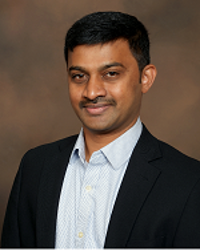 Dr. Raju Gottumukkala is the Director of Research of Informatics Research Institute and AAMA/LEQSF Regents Assistant Professor with Mechanical Engineering Department at the University of Louisiana at Lafayette. He led various R&D efforts in the area of data science, disaster management, and cyber-physical systems. He recently led a National Science Foundation-funded effort to develop data-driven decision support tools for real-time tracking of COVID-19. As part of this effort, he worked closely with the City of New Orleans Mayor’s office to develop an analytics-based decision support tool to help the city understand and manage risk related to minimizing infection spread risk while balancing the economy.
Dr. Raju Gottumukkala is the Director of Research of Informatics Research Institute and AAMA/LEQSF Regents Assistant Professor with Mechanical Engineering Department at the University of Louisiana at Lafayette. He led various R&D efforts in the area of data science, disaster management, and cyber-physical systems. He recently led a National Science Foundation-funded effort to develop data-driven decision support tools for real-time tracking of COVID-19. As part of this effort, he worked closely with the City of New Orleans Mayor’s office to develop an analytics-based decision support tool to help the city understand and manage risk related to minimizing infection spread risk while balancing the economy.
Ramesh Kolluru, Associate Provost and Vice President for Research, Innovation and Economic Development at the University of Louisiana at Lafayette
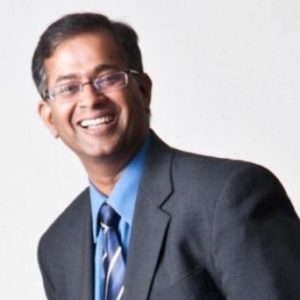 Dr. Ramesh Kolluru serves as the Associate Provost and Vice President for Research, Innovation and Economic Development at the University of Louisiana at Lafayette. He is a nationally recognized leader in the areas of science and technology, translational and public-impact research, economic and workforce development, as well as innovation and entrepreneurship.
Dr. Ramesh Kolluru serves as the Associate Provost and Vice President for Research, Innovation and Economic Development at the University of Louisiana at Lafayette. He is a nationally recognized leader in the areas of science and technology, translational and public-impact research, economic and workforce development, as well as innovation and entrepreneurship.
He is a tenured Professor in the School of Computing and Informatics, with expertise in computing, health innovation, homeland security and emergency management, public-private partnerships, data science and big data, among others. As a researcher, he helped establish major R&D centers in health innovation and disaster management in addition to a data science center funded by the National Science Foundation. He has generated more than $90M in funds from various federal and state agencies as well as industry.
In his role as Vice President for Research, he establishes strategic vision, and provides direction to transition the University of Louisiana into a top-tier research university as it expand its regional, national, and global impact through research, innovation, and economic development. Under his leadership, UL has increased its annual R&D expenditures from $62M in 2013 to $144M in 2019, a growth of 133%, while increasing its intellectual human capital (post-doctoral & research scholars) by 1678% and innovation outcomes (patents issued) by 1200%. He has served as the University’s point-person in helping recruit IT and biotech companies, helping create more than 2000 knowledge-economy jobs in the region. Under his leadership, UL is focused on discovery and dissemination, embodied in its motto of being commitment to “Research for a Reason.”
Given his national recognition as a leader in health innovation, he was appointed into the role of Chief Innovation Officer for the US Department of Health and Human Services in Washington, D.C, during 2019 and 2020. During his 15-month assignment (while continuing his role at UL), he worked on expanding the role of data science, AI, and innovation in the delivery of health and human services to all Americans by HHS. He was instrumental in the development of a strategic roadmap for HHS to enhance open data and open innovation initiatives, in addition to expanding opportunities for upskilling data science know-how of federal government workers.
Additionally, he has been appointed by FEMA Administrator to the FEMA National Advisory Council to serve a three-year term from 2018 through 2021, where he co-chairs the FEMA Vision 2045 sub-committee. He is a member of the Executive Committee of the American Public and Land-grant Universities (APLU) Council for Research (COR), where he has been involved in taskforces advancing public impact of research, safe and inclusive research environments across the nation, among others. Governor John Bel Edwards appointed him as a Commissioner of the Louisiana Cybersecurity Commission, where he led the efforts to develop Louisiana’s Critical Infrastructure Cybersecurity Strategic Plan, in partnership with the National Governors Association. He represents the University as counselor of the Oak Ridge Associated Universities, trustee of the Southern Universities Research Alliance, and member of the Louisiana RESTORE Act Center of Excellence. He serves on the Louisiana Supply Chain and Transportation Council, established by the Legislature in 2016. Further, he serves as a trustee / executive committee member / board member of the Lafayette Public Innovation Alliance, OneAcadiana, and Lafayette Economic Development Authority to advance local and regional economic development capacity.
Born and raised in India, Dr. Kolluru has lived in Lafayette for over 25 years. Recipient of the Governor’s Technology Leader of the Year award in 2008, he is prouder of the title “Honorary Cajun” bestowed on him by Lafayette Parish-President Mayor Joey Durel. His proudest titles, however, are husband, dad, speech-coach, friend, dish-washer, and chauffeur!
Rastin Rastgoufard, Founder of Unocity, New Orleans, LA, USA
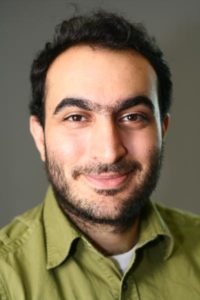 Rastin Rastgoufard, Ph.D. created and operates the company Unocity to provide Machine (and Human!) Learning, Data Analytics, and Automation Consulting based on his doctoral research. He completed his Ph.D. in 2018 from the University of New Orleans after receiving his Master’s degree from the same university in 2012. He was in Tulane University’s last Electrical Engineering graduating class in 2008 where he received his Bachelor of Science.
Rastin Rastgoufard, Ph.D. created and operates the company Unocity to provide Machine (and Human!) Learning, Data Analytics, and Automation Consulting based on his doctoral research. He completed his Ph.D. in 2018 from the University of New Orleans after receiving his Master’s degree from the same university in 2012. He was in Tulane University’s last Electrical Engineering graduating class in 2008 where he received his Bachelor of Science.
From 2013 to 2018 Rastin was the Technical Lead of the Power and Energy Research Lab (PERL) at the University of New Orleans. He headed many research projects with the electric utility Entergy and led teams of Master’s and Ph.D. students while collaborating with faculty in PERL. His work there focused on real-time transient analysis using hardware-in-the-loop simulators, safety and automation procedures, hurricane analysis, and grid modernization leading to smart cities.
Rastin has many research publications in machine learning as well as power systems. He has presented his works multiple times internationally. Some of his publications are captured in his Ph.D. Dissertation (Multi-Label Latent Spaces with Semi-Supervised Deep Generative Models) and Master’s Thesis (The Interacting Multiple Models Algorithm with State-Dependent Value Assignment), both of which are freely-available online.
At Unocity, he has created many data-centric and automation-heavy applications including Storyteller, Data Scryer, Lexl, Colooperate, and HurrD.ai. He also designs custom-built circuit boards and sensors that leverage real-time streaming data and run entirely from solar power.
In addition to researching and running Unocity, Rastin has been on the Organizing Committee of the UNO Engineering Forum since 2014 where he provides its artistic flair and writes software to automate many of the technical issues pertaining to the operation of the Forum, including website management, registration handling, and audio/visual configuration.



